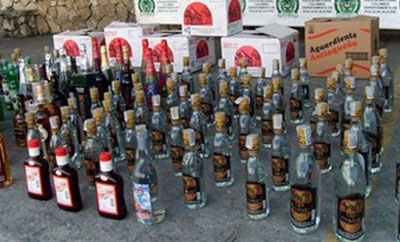As the contraband trade in Colombia has grown into a $6 billion business controlled largely by organized criminal groups, it has become a national security problem, says one official, highlighting the need for better customs controls.
In an interview with El Tiempo, Gustavo Moreno Maldonado, head of a special contraband unit of Colombia’s tax and customs police, said the contraband trade “does not just affect the economic security of the state… it is a national security phenomenon,” used by groups like the Revolutionary Armed Forces of Colombia (FARC) to launder drug proceeds. He said the murder of a police officer in Cali last May is believed to be linked to these contraband networks.
According to statistics quoted by Moreno, contraband networks move around $6 billion a year, a value equivalent to nearly 10 percent of the total legal annual importations ($58 billion). The official also said that just 11.4 percent of declared goods entering the country each year are inspected.
Moreno detailed the varying origins of black market products: liquor and cigarettes enter mainly through the northermost department La Guajira, with many cigarettes coming from Paraguay; clothing and shoes sourced from China; and perishable food items from Ecuador and Venezuela.
InSight Crime Analysis
The Colombia-Venezuela border region has long been a center for the movement of black market products, although the past few years has seen new actors become involved in the trade contraband trade. Authorities believe the discovery of 11 tons of contraband beef near the Venezuelan border in May was linked to money laundering operations of the FARC, the Urabeños and Rastrojos. The size of the bootleg liquor trade, meanwhile, thought to be controlled by BACRIM groups in major cities, was highlighted by the seizure of $1 million in liquor and cigarettes in the Bolivar department in March.
Goods are often purchased in duty free zones such as those in Colon, Panama, and then resold in Colombia. Meanwhile, in Venezuela, criminals take advantage of the cheap black market price of Venezuelan Bolivares to purchase goods.
Moreno’s interview with El Tiempo is one sign that authorities recognize the extent of the problem. However, contraband is not only a national security issue — those involved in the trade have previously demonstrated their ability to infiltrate politics in departments such as La Guajira.

